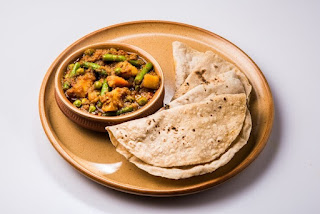When planning a healthy evening meal, one of the most common questions is whether to eat rice or roti. Both rice and roti can be healthy choices depending on your fitness goals, digestion, and energy needs. Understanding the differences between them can help you make the best choice for your nighttime nutrition.
Rice: A Quick Energy Booster
Rice is a popular choice for dinner, especially for those looking for quick energy. Here's why rice might be a good option at night:
-
Easier to Digest: Rice is known for being easy to digest, making it a great option for people with sensitive stomachs or those who prefer a lighter meal at night.
-
Good for Recovery: If you're someone who exercises in the evening, rice is an excellent choice for replenishing glycogen stores. The quick-digesting carbs help the body absorb energy faster, aiding in muscle recovery.
-
Best for Post-Workout: If you're having dinner after a workout, rice is an ideal choice. Fast-digesting carbs provide a quick energy source to support muscle recovery.
-
Pair with Lean Protein: For muscle repair, combine rice with lean protein sources such as chicken, tofu, or legumes. This will help optimize recovery and keep you feeling full longer.
However, it's important to control portion sizes. Eating too much rice, especially late at night, can lead to fat storage due to excess calories. Stick to small portions to avoid overeating.
Roti: A Slow-Digesting, Fiber-Rich Option
Roti is made from whole wheat flour and is often considered the healthier choice for evening meals. Here’s why:
-
Higher in Fiber: Roti contains more fiber than rice, which can help with digestion and keep you full for a longer period. The fiber helps promote a feeling of fullness and helps prevent late-night cravings.
-
Slow-Digesting Carbs: Unlike rice, roti is made up of complex carbohydrates that digest slowly, providing you with a steady release of energy throughout the night. This helps to regulate blood sugar levels and keeps you energized without spikes and crashes.
-
Supports Weight Control: Because of its fiber content and slow digestion, roti can help control weight. It provides a lower spike in insulin compared to rice, which is beneficial for weight management.
-
Better for Digestion: The high fiber content in roti promotes a healthy digestive system. If you’re someone prone to digestive issues, opting for roti might be a better choice at night.
Like rice, be mindful of how much ghee or oil you use when preparing roti. While it’s a healthy food choice, excessive fat can negate its benefits.
Which One Is Better at Night?
The decision between rice and roti depends on your specific goals:
-
Rice is a better choice for those who are looking for quick energy replenishment, particularly after a workout. If you need fast-digesting carbs for muscle recovery, rice is your go-to option.
-
Roti is better for those trying to control weight, as it provides slow-digesting carbs that keep you fuller for longer, preventing late-night snacking and cravings.
Balanced Approach: Best of Both Worlds
If you want to combine the benefits of both foods, try a balanced approach. For instance:
-
Roti with protein: Pair a roti with a healthy source of protein (like chicken, paneer, or lentils) for a nutritious and filling meal that will keep you full through the night.
-
Rice with high-fiber veggies: You can also opt for rice but pair it with fiber-rich vegetables like broccoli, spinach, or carrots. This will slow down the digestion of rice and make the meal more balanced and nutritious.
Conclusion:
Both rice and roti have their own set of benefits when it comes to nighttime nutrition. If you’re looking for quick energy and muscle recovery, rice is an excellent option, especially after a workout. On the other hand, if you want to promote steady energy release and improve digestion, roti is the better choice. For a well-rounded meal, consider combining both options with lean proteins or fiber-rich vegetables. Remember, portion control is key to achieving the best health benefits from either option.
Top FAQs
1. Which is better at night, rice or roti?
It depends on your goals. Rice is better for muscle recovery and post-workout meals, while roti is better for weight control, digestion, and steady energy release overnight.
2. Can I eat rice at night for weight loss?
Rice can be eaten at night, but portion control is important. Eating too much rice can lead to weight gain. Choose small portions of rice and pair with lean protein or vegetables for a balanced meal.
3. Which one is better for digestion, rice or roti?
Roti is generally better for digestion because it contains more fiber, which supports gut health and helps prevent digestive issues. However, rice is easier to digest for some people.
4. Is roti healthier than rice?
Roti is higher in fiber and provides slow-digesting carbs, making it a better option for weight control and digestion. Rice is quicker to digest and better for quick energy replenishment.
5. Can I combine rice and roti in one meal?
Yes! You can combine both rice and roti with protein or vegetables for a balanced and nutritious meal. A little of both can provide the benefits of each food while keeping you full and satisfied.

%20Foods%20That%20May%20Ease%20Your%20Pain.jpg)




%20Benefits,%20Nutrition,%20Side%20Effects,%20and%20How%20to%20Use.jpg)




No comments:
Post a Comment